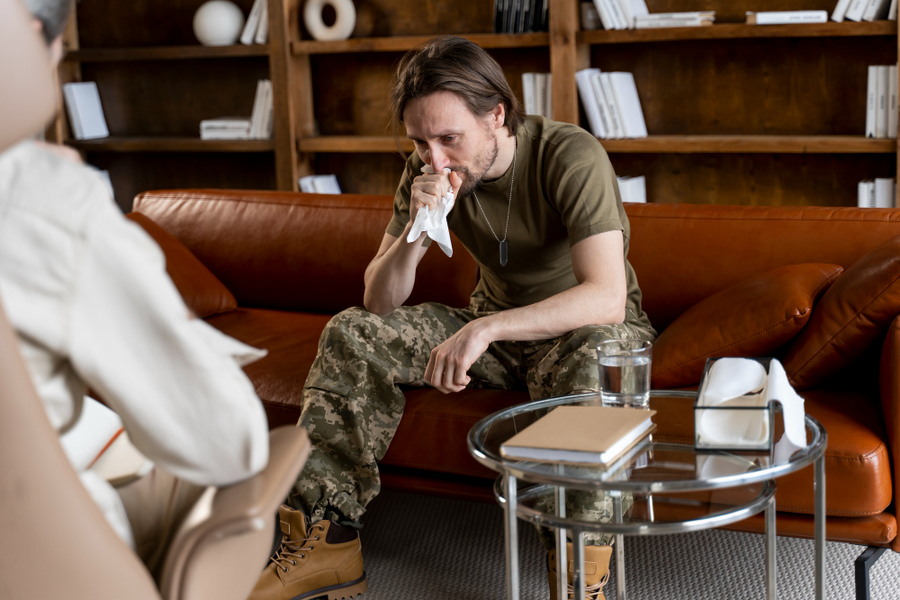The Impact Of Traumatic Events On Mental Health
About one in three adults has experienced at least one traumatic event. These events often involve situations that threaten an individual’s safety or that of someone close to them, leaving a deep impact. Traumatic experiences are more common than many think, influencing mental health and emotional resilience.
Trauma can stem from various situations, such as road accidents, prolonged abuse, natural disasters, or serious illnesses. It’s not only the physical harm that matters but also the emotional strain of seeing loved ones in danger. Recognizing and understanding trauma is essential for offering support and building a compassionate community.

How Does Your Body React to a Traumatic Experience?
Understanding Your Body’s Response to Trauma
When you go through a traumatic event, your body reacts by triggering a stress response. This response can lead to both physical and emotional changes that may feel overwhelming.
In this “fight or flight” mode, your body releases chemicals to prepare for emergency action, resulting in symptoms like:
- Raised blood pressure
- Increased heart rate
- Increased sweating
- Reduced stomach activity (loss of appetite)
This response is part of our evolutionary survival mechanism, making it easier to fight or flee from danger. It’s normal and is meant to help you handle immediate threats effectively.
While these symptoms usually fade with time, some individuals may feel a prolonged sense of stress and anxiety. Recognizing this response as a natural process can be the first step in managing trauma effectively.
Immediate Emotional Reactions to Trauma
Right after experiencing trauma, many people initially go into a state of shock and denial. This phase, which can last hours or even days, is the body’s way of temporarily shielding the mind from overwhelming emotions.
During this period, people often feel a mix of emotions, including:
- Shock, which may cause numbness or disbelief
- Denial, where the event feels unreal or distant
- A sense of disconnection from reality or surroundings
Gradually, these feelings can shift to others like sadness, anger, or guilt, as the reality of the event sinks in. These are common reactions and are part of the natural recovery process.
In most cases, as time progresses, these initial emotional responses lessen, allowing for healing and a return to daily life. However, monitoring your emotions and understanding these phases can be helpful in gauging recovery progress.
When Trauma Responses Persist
While many people find their symptoms improve over time, some may struggle with lingering effects. When these intense feelings do not subside, they can evolve into more serious mental health issues.
Persistent trauma symptoms can potentially lead to:
- Post-traumatic stress disorder (PTSD)
- Depression and chronic anxiety
- Sleep disturbances or mood swings
These long-lasting effects may require additional support, as they often indicate that the trauma has deeply affected mental well-being. If left untreated, they can interfere with daily life and relationships, making it difficult to move forward.
Taking steps to address persistent symptoms through counseling, support groups, or therapy can make a significant difference. Early intervention is key in helping individuals process and overcome long-term effects of trauma.
Seeking Professional Support for Trauma Recovery
If trauma symptoms persist or worsen, seeking professional help is often the best step forward. Mental health professionals are equipped to guide individuals through the healing process with targeted support.
Professional support may include:
- Counseling sessions to explore emotional responses and coping mechanisms
- Cognitive Behavioral Therapy (CBT) for addressing and reframing negative thought patterns
- Support groups for sharing experiences and gaining peer support
Engaging in professional support can make a significant difference in overcoming trauma’s lasting effects. For many, this step marks a positive turning point toward sustained mental well-being and resilience.

How Can You Take Care of Yourself After a Traumatic Experience?
Building a Support Network
After experiencing trauma, reaching out to close family and friends can feel challenging. You may not want to burden them with your emotions or may need time to process on your own.
However, connecting with others can play a vital role in recovery. Consider these options for building a support network:
- Spend time with family and friends without needing to discuss the trauma.
- Look for community support groups where others may share similar experiences.
- Contact organizations that provide assistance for trauma survivors.
Being around others can create a sense of stability and understanding. Even if you don’t talk about the trauma, their presence can be a source of comfort. Over time, these supportive interactions can ease feelings of isolation.
Connecting with Support Organizations
If you lack nearby support, consider reaching out to specialized organizations. These groups offer experienced guidance tailored to those affected by trauma.
Support organizations can assist with:
- One-on-one counseling for personalized guidance.
- Access to resources like online communities and hotlines.
- Group sessions where participants can find shared understanding.
Engaging with these organizations can provide a compassionate space for healing. Many are trained to help individuals in crisis. Seeking professional support can make a significant difference in navigating recovery.
Prioritizing Self-Care for Healing
After trauma, prioritizing self-care becomes essential for both physical and mental well-being. Taking time for yourself can promote a sense of calm and stability.
Key aspects of self-care include:
- Taking regular breaks from daily responsibilities.
- Eating nutritious meals to support energy and mood.
- Avoiding drugs and alcohol, which can worsen symptoms.
By focusing on health and well-being, you create a foundation for recovery. Small, consistent self-care actions can gradually improve your resilience and outlook. The process may be slow, but it is a powerful part of healing.
Exploring Healthy Outlets for Emotions
Finding constructive outlets can be another effective way to process trauma. Expressing your emotions in healthy ways can help release tension and reduce stress.
Some healthy outlets for processing emotions are:
- Engaging in creative activities like journaling, painting, or music.
- Practicing mindfulness techniques, such as meditation or breathing exercises.
- Physical activity, including walking, yoga, or sports.
Each of these outlets allows emotions to flow naturally without overwhelming you. Practicing these regularly can promote emotional balance over time. Exploring different outlets can help you find what best supports your healing journey.
Setting Realistic Goals for Recovery
Recovery from trauma is a gradual process, and setting realistic goals can help make it more manageable. Taking small steps forward can prevent overwhelm and build confidence.
To create achievable recovery goals, try the following:
- Start with small, daily tasks that bring a sense of accomplishment.
- Gradually increase activities that help rebuild routine and structure.
- Adjust expectations and avoid pressuring yourself to “get over it” quickly.
By focusing on these small, manageable goals, you can celebrate progress at each step. This approach allows you to recognize personal growth. Each goal reached is a step closer to a stronger sense of well-being.
Practicing Patience and Compassion with Yourself
Being kind to yourself during recovery is essential, as healing from trauma can take time. Many people find it hard to avoid self-criticism during this process, but practicing patience can be a powerful tool.
Self-compassion can include:
- Accepting that healing is not a linear process.
- Giving yourself permission to feel and process emotions without judgment.
- Reminding yourself that recovery is personal and may take longer than expected.
Being patient and gentle with yourself can ease pressure during challenging times. Over time, self-compassion fosters resilience. This kindness can be an essential part of fully rebuilding after trauma.
Conclusion
If you’re noticing symptoms that are impacting your daily life, reaching out for professional help can make a significant difference in your recovery. Consider seeking support if you feel isolated, if your emotions haven’t normalized after six weeks, or if loved ones have expressed concern about changes they’ve noticed.
Your family doctor or GP is a great first step—they can offer guidance on treatment and may connect you with a specialist for further support. Taking this step can be a powerful move toward regaining stability and feeling more like yourself again.
Frequently Asked Questions
How long does it usually take to feel normal again after trauma?
Recovery times vary from person to person, and it’s normal to feel intense emotions for several weeks. If symptoms persist beyond six weeks, consider reaching out for professional support to help manage lingering effects.
What if I’m not comfortable talking about my experience with others?
You don’t have to discuss the details of your trauma if you’re not ready. Simply spending time with supportive people can help you feel less isolated and promote healing over time.
Can I manage trauma symptoms on my own, or do I need professional help?
Some people find relief through self-care practices, like mindfulness or journaling, but if symptoms disrupt your daily life, professional guidance can be very beneficial. A counselor or therapist can offer specific coping strategies and support.
Is it normal to experience physical symptoms after trauma?
Yes, physical reactions such as increased heart rate, sweating, and difficulty sleeping are common after trauma. These are part of your body’s natural response to stress and often fade over time, though persistent symptoms may need attention.
How can I know if someone else might be struggling with trauma?
People coping with trauma may seem withdrawn, experience mood swings, or have difficulty concentrating. Gently encouraging them to seek help or offering to listen can be a meaningful way to support their healing.

